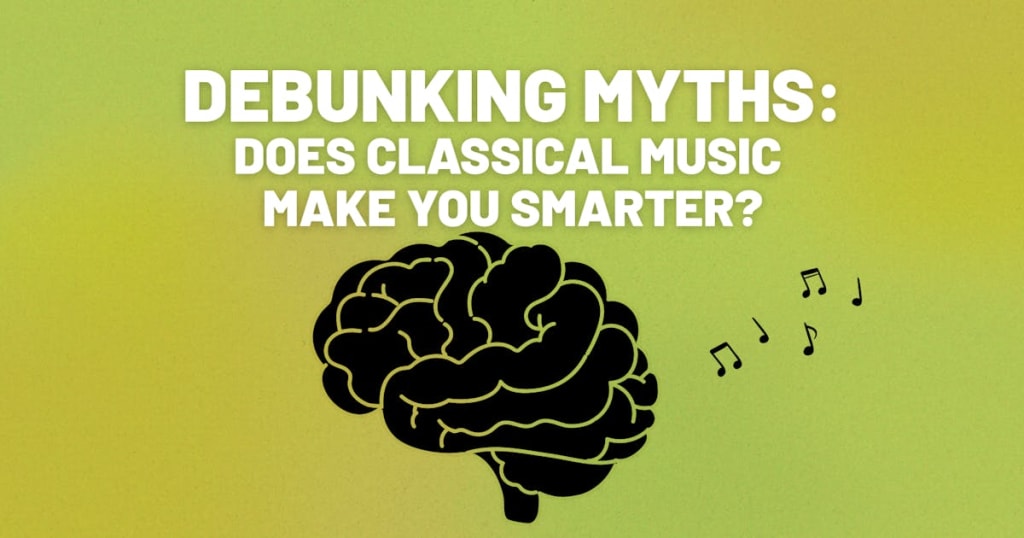Top 5 Music Myths Debunked: What You Need to Know
Debunk the top five music myths

Music is an integral part of our lives, yet it is often surrounded by myths that can mislead and discourage aspiring musicians. These myths can shape our perceptions and expectations in ways that are not always beneficial. Whether you are a budding musician, a music enthusiast, or someone curious about the world of music, understanding these misconceptions can help you navigate your musical journey with more confidence and clarity. In this article, we will debunk the top five music myths, providing clarity and encouragement for those who love music.
Myth 1: You Need to Be Young to Learn Music
A common belief is that music can only be learned effectively at a young age. This myth can discourage adults from pursuing music education. However, many adults have successfully learned to play instruments or sing. Adult learners often have the advantage of discipline, focus, and a clear motivation to learn, which can be just as valuable as starting young.
Reality: Learning music at any age is not only possible but also highly rewarding. Adults bring life experience, patience, and often a deeper appreciation for music, which can enhance their learning process. Numerous adults have taken up instruments or vocal training later in life and have found great success. The key is consistent practice and a genuine passion for music.
Example: Consider the story of James Rhodes, a renowned concert pianist who began serious piano training in his late twenties. Despite starting later than many of his peers, his dedication and love for music propelled him to international success.
Myth 2: Music Theory Is Too Complicated
Music theory is often seen as a daunting and complex subject. While it does require study and practice, it is not insurmountable. Understanding music theory can actually simplify the process of learning and creating music by providing a structured approach to understanding musical elements.
Reality: Music theory is a tool that can greatly enhance a musician's ability to understand and create music. It is not an end in itself but a means to achieve greater musical freedom and creativity. Many online resources, apps, and books make learning music theory accessible and engaging for beginners and experienced musicians alike.
Example: Many self-taught musicians, like Jimi Hendrix, eventually learned aspects of music theory to better understand and expand their musical capabilities. Hendrix's innovative guitar work was partly a result of his informal yet effective grasp of music theory.
Myth 3: You Need Expensive Gear to Make Good Music
The idea that high-quality music production requires expensive equipment is a myth. Many successful musicians have started with basic gear and achieved excellent results through creativity and skill. The key to good music is not the cost of the equipment but the talent and effort of the musician.
Reality: Good music can be created with minimal and affordable equipment. In today's digital age, there are countless tools and software available at low costs that can produce professional-quality music. The creativity and skill of the musician are far more important than the price tag on their equipment.
Example: Billie Eilish and her brother Finneas recorded her Grammy-winning debut album, "When We All Fall Asleep, Where Do We Go?" in their small bedroom studio using relatively inexpensive equipment. Their success demonstrates that talent and creativity outweigh the need for high-end gear.
Myth 4: Classical Music Is for the Elite
Classical music is often seen as exclusive and reserved for the elite. This myth overlooks the fact that classical music has roots in folk traditions and was often enjoyed by the general public in past centuries. Today, classical music is accessible to everyone, and many pieces are incredibly relatable and emotionally powerful.
Reality: Classical music is for everyone. It encompasses a wide range of emotions, stories, and cultural histories that resonate with people from all walks of life. Many classical compositions have found their way into popular culture, film scores, and even commercials, proving their universal appeal.
Example: The widespread use of Beethoven’s "Ode to Joy" or Mozart’s "Eine kleine Nachtmusik" in movies, TV shows, and public events highlights the accessibility and enduring popularity of classical music. Moreover, community orchestras and free concerts have made classical music more accessible to the public.
Myth 5: Music Practice Must Be Grueling
The notion that music practice must be long and tedious is a misconception. Effective practice is about quality, not quantity. Short, focused practice sessions with clear goals can be more productive than hours of unfocused practice. Enjoying the process and finding fun in practicing can lead to better results and sustained progress.
Reality: Productive practice involves setting specific goals, breaking down tasks into manageable parts, and maintaining a positive and enjoyable practice environment. Techniques such as the Pomodoro method, where practice is broken into short, focused intervals, can be highly effective.
Example: Celebrated cellist Yo-Yo Ma has emphasized the importance of enjoying the practice process. He advocates for mindful practice, where musicians are fully engaged and present, rather than simply going through the motions.
Understanding the truth behind these common music myths can empower and motivate aspiring musicians and enthusiasts alike. By dispelling these misconceptions, we open the door to a more inclusive and enjoyable musical journey for everyone. Music is an art form that should be accessible to all, and these myths should not deter anyone from exploring their musical potential.
Have you ever been held back by any of these music myths? Share your stories and insights in the comments below. If you found this article enlightening, please share it with your friends and fellow music lovers to help spread the truth about music!
For more articles on music and tips for musicians, subscribe to our newsletter. Join our community of music enthusiasts and stay updated with the latest trends, tutorials, and stories from the world of music. Don’t let myths hold you back—embrace the truth and let your musical journey flourish!
About the Creator
Music Industry Updates
Welcome to Music Industry Updates, your go-to hub for the latest happenings in the music world.
Stay tuned, stay informed, and stay inspired with Music Pulse – where every beat counts.
Enjoyed the story? Support the Creator.
Subscribe for free to receive all their stories in your feed. You could also pledge your support or give them a one-off tip, letting them know you appreciate their work.






Comments
There are no comments for this story
Be the first to respond and start the conversation.